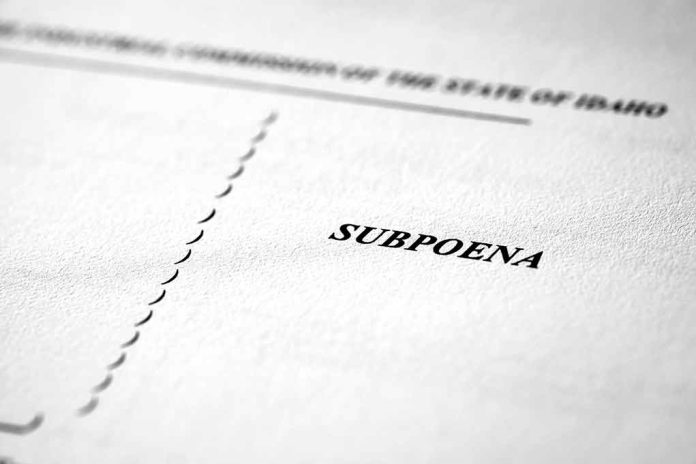
Special Prosecutor Nathan Wade’s testimony in the Trump investigation sheds light on controversial subpoena and relationship with DA Fani Willis.
At a Glance
- Nathan Wade testified for 4.5 hours before Congress despite ankle injury
- Wade addressed questions about investigation independence and relationship with DA Fani Willis
- Nearly 1,900 pages of case documents released, with significant redactions
- Trump and 18 co-defendants indicted on racketeering charges; most plead not guilty
- Release follows Supreme Court discussions on presidential immunity scope
Wade’s Testimony and Subpoena Controversy
Nathan Wade, a former Fulton County special prosecutor, recently provided over four hours of testimony to Congress, addressing concerns about his role in the Trump investigation and his relationship with District Attorney Fani Willis. The testimony came after a controversial subpoena service attempt, complicated by Wade’s fractured ankle from a basketball game.
During his testimony, Wade strongly defended the integrity of the investigation, stating:
“was not politically motivated, rather it was an independent investigation based upon facts, interviews, evidence, and the rule of law. I had no mandate other than to honestly seek the truth.”
This statement aims to counter accusations of political bias in the prosecution of former President Donald Trump and his associates.
Former Fulton County Special Prosecutor Nathan Wade spend hours on Capitol Hill testifying before House Judiciary Committee investigators as part of their investigation into his relationship with District Attorney Fani Willis. https://t.co/sIcpG8VtLd
— FOX 5 Atlanta (@FOX5Atlanta) October 16, 2024
Release of Case Documents
In a significant development, a judge overseeing Donald Trump’s 2020 election interference case released nearly 1,900 pages of heavily redacted documents. These documents, initially filed under seal, are crucial in determining which allegations can proceed to trial.
The release includes a mix of previously public material and new evidence. Visible content encompasses excerpts from Mike Pence’s book, witness testimony to the January 6th committee, and Trump’s controversial call to Georgia election officials. However, most pages remain redacted, likely protecting grand jury testimony covered by secrecy rules.
Legal Implications and Trump’s Response
The document release is part of a broader prosecution strategy, presented in a 165-page brief arguing against Trump’s claim of immunity from prosecution. This development follows recent Supreme Court discussions on the scope of presidential immunity, highlighting the complex constitutional questions at play.
“we love you” … “you’re very special”
These words from Trump, included in the released documents, have been scrutinized as part of the investigation into the events surrounding January 6th. Trump and his legal team continue to assert that the multiple legal actions against him constitute a politically motivated “witch hunt.” They opposed the timing of the document release, citing concerns about its impact on the upcoming presidential election.
Ongoing Investigation and Future Implications
As the case progresses, it raises significant questions about the balance between executive privilege and accountability in our democratic system. The inclusion of January 6th Committee findings and official communications in the evidence framework underscores the comprehensive nature of the investigation.
The outcome of this case could have far-reaching implications for future election-related investigations and the scope of presidential immunity. As the legal proceedings continue, they will likely shape the discourse around executive power and the role of Congress in oversight for years to come.
Sources:
- Nathan Wade Reveals Why House Committee Couldn’t Find Him for Subpoena
- Judge unseals heavily redacted trove of evidence in Trump’s 2020 election interference case






